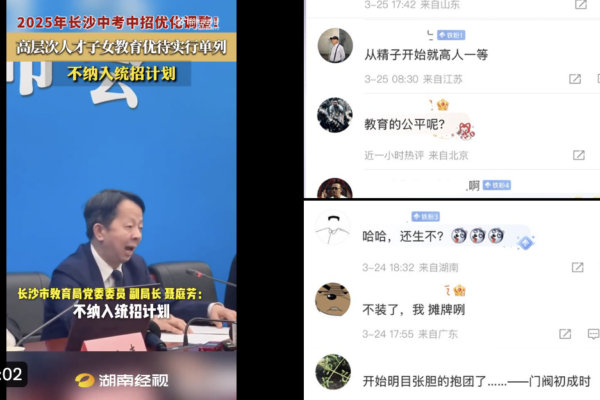Recently, Changsha, Hunan Province announced that the children of high-level talents will be separately listed in the high school entrance examination and not included in the general admissions, sparking controversy as people believe this move shows the Chinese Communist Party extending privileges into the education sector.
On March 24th, the Changsha Education Bureau held a press conference on the reform of the high school entrance examination and enrollment system, introducing related policy preferential treatment items. Officials announced that starting from 2025, the children of high-level talents will enjoy educational benefits by being separately listed and not included in the general admissions plan.
Staff from the Basic Education Department of the Changsha Education Bureau explained to the media: in the past, out of 100 general admissions, 2 were children of high-level talents, leaving only 98 spots for regular students. After the reform, children of high-level talents will not occupy any of the 100 general admissions slots.
According to the Changsha Municipal Government website, high-level talents refer to individuals approved by local authorities and holding a talent green card. This includes: A class of international top talents, B class national leading talents, C class provincial and municipal leading talents, and D class enterprise executives or technical talents with an annual salary of over 500,000 yuan.
The announcement on social media platforms has sparked questioning.
Netizens criticized: “Special treatment.” “I estimate everyone will see this as another form of educational injustice.” “It’s about family background, there’s nothing we can do.” “They are not giving you opportunities; they are legally taking up these positions in advance.” “A return to the era of aristocratic families, just missing a Yellow Turban Rebellion.”
On WeChat account “命裡運不彆扭” (one’s destiny cannot be twisted), a post titled “Changsha’s new policies on high school entrance examinations fuel public opinion: Talent favoritism or hereditary privilege? An educational experiment that divides society” pointed out that D class talents make up the vast majority of designated talents in Changsha (accounting for 86% in the 42nd batch announcement list), and the label of “high annual salary” for this group is easily criticized as the legitimation of “capital privilege.”
The most recent announcement on the “Changsha City’s 42nd Batch of High-level Talent Classification Identification List” showed a total of 94 individuals, including 1 from B class, 12 from C class, and 81 from D class.
The lack of transparency in the talent identification process has also raised concerns. The article stated, “Yet the public remains concerned: if the evaluation of ‘high-level talents’ turns into a tool for power rent-seeking, can those with ‘connections’ who shine shoes also be included? This concern is not unfounded—when policy dividends are tied to personal interests, corruption risks will inevitably follow.”
WeChat account “深圳文學” (Shenzhen Literature) posted an article titled “True nepotism: Changsha’s high school entrance exam separately lists ‘children of high-level talents,’ making a mockery of the principle of education egalitarianism once again,” pointing out that the new regulations have sparked parents’ fears of social stratification, with the public worrying that this move “will become a broken window for other privileged groups to break through educational equity.”
This issue has also sparked discussions on overseas platforms:
“Children of cadres?” “They are starting to play a caste system.” “It has always existed; now it’s just being spoken about.” “The children of cadres have long moved to different tracks, who is taking the national exams now? They have sent their children abroad early on, and the basic non-existence of exam fraud is because they look down on the domestic education resources.” “The lower-class population is deprived of political rights for life.” “Just as they have special supplies for food, the children of talent also have to have special treatment.”

